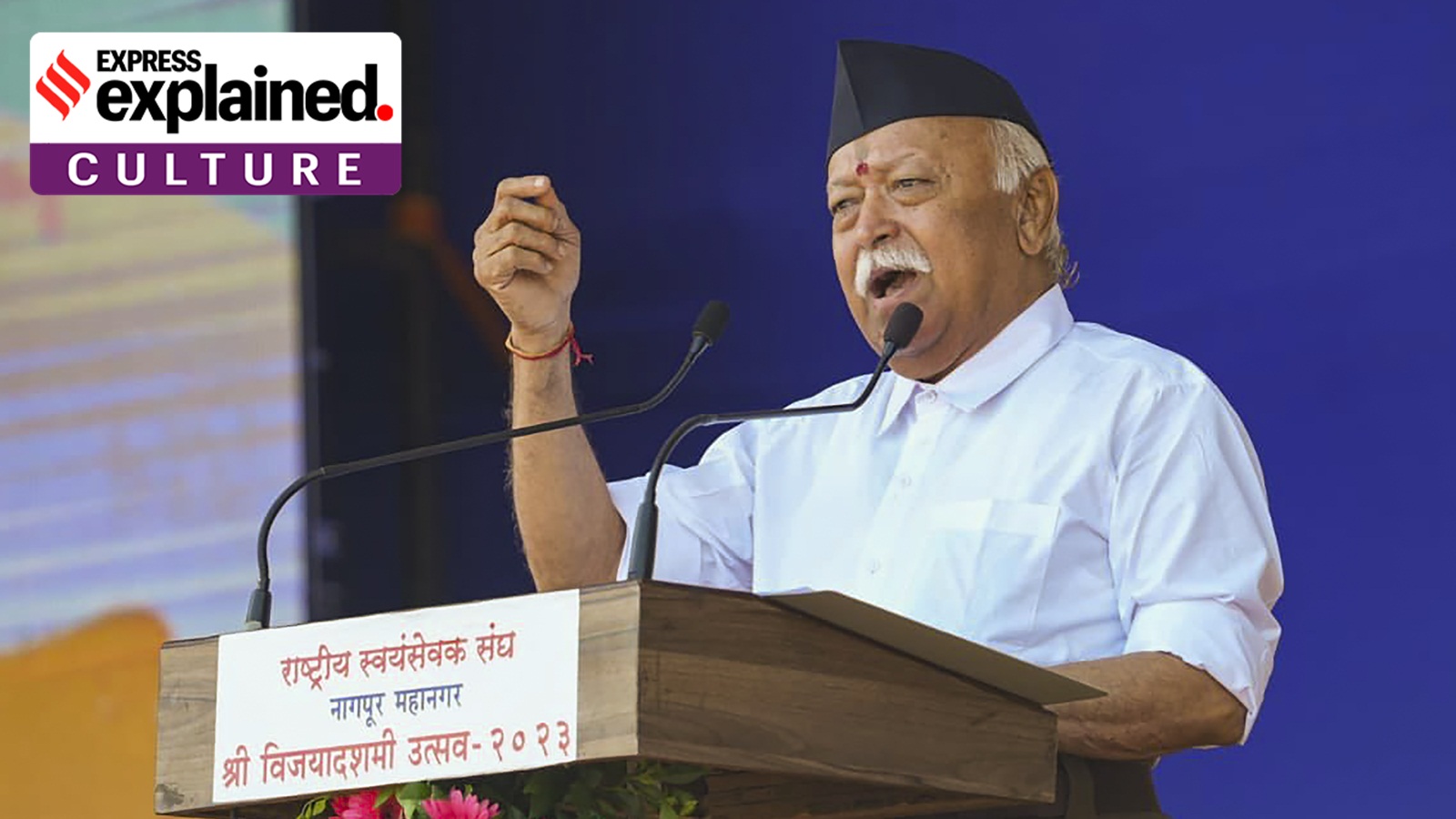RSS chief Mohan Bhagwat mentions ‘woke’ in speech: What does the word mean?
The word can now be said to have gone global – conservative politicians in Europe and Australia have mocked ideas of inclusivity as ‘woke’, using it to also refer to causes like gender equality and environmental conservation. Here is its meaning and history.
 Rashtriya Swayamsevak Sangh (RSS) chief Mohan Bhagwat addresses RSS' 'Vijayadashmi Utsav', in Nagpur, Tuesday, Oct. 24, 2023. (PTI Photo)
Rashtriya Swayamsevak Sangh (RSS) chief Mohan Bhagwat addresses RSS' 'Vijayadashmi Utsav', in Nagpur, Tuesday, Oct. 24, 2023. (PTI Photo) RSS chief Mohan Bhagwat termed “cultural Marxists or woke” people as “deceitful and destructive forces” in the country, in his Vijaydashami speech in Nagpur on Tuesday (October 24).
Bhagwat attempted to draw a contrast with the progress India has made, saying, “Though these forces wear the mask of some ideology or the other, and claim to be working for some lofty goals, their real objectives are something else… These destructive, all-devouring forces call themselves cultural Marxists or Woke, or the awakened ones. But they have forgotten Marx since the 1920s… Their modus operandi involve taking control of the media and academia, and plunging education, culture, politics and social environment into confusion, chaos, and corruption.”
The word ‘woke’ has its origins in the United States and has become a focus of cultural debate of late.
Where does the word ‘woke’ come from?
The journey of the word has been long, going from standing for empowerment and social activism to now being seen with at least some suspicion – from across the political spectrum.
Initially, it was used within Black communities, derived from the word ‘awake’. The Merriam-Webster Dictionary explains, “Woke is a slang term that is easing into the mainstream from some varieties of a dialect called African American Vernacular English (sometimes called AAVE). In AAVE, awake is often rendered as woke, as in, ‘I was sleeping, but now I’m woke.’”
It signalled the need to stay aware or vigilant in the face of threats of violence, with laws still denying basic rights to Black people in many spheres of life, ranging from their free movement to voting.
Journalist Aja Romano, writing for Vox, noted that in 1923 a collection of ideas by the Jamaican social activist Marcus Garvey included “Wake up Ethiopia! Wake up Africa!” as a call to global Black citizens to become more socially and politically conscious.
Its usage increased as an organised fight for recognition solidified. An article in The Conversation states how in 1965, civil rights leader Martin Luther King Jr gave an address called ‘Remaining Awake Through a Great Revolution’ at Oberlin College, where he said: “There is nothing more tragic than to sleep through a revolution… The wind of change is blowing, and we see in our day and our age a significant development… The great challenge facing every individual graduating today is to remain awake through this social revolution.”
How has the meaning of woke evolved?
The dictionary says the word has been incorporated into Black artists’ music, which has often been political in its references and lyrics. In 2008, American singer Erykah Badu’s song ‘Master Teacher’ had “I stay woke” as a refrain. Here, the meaning here also had to do with self-growth. Badu, years later, tweeted the phrase to show support for Russian musicians who were tried by authorities, reflective of its usage going beyond racism.
Many decades later, woke was also used as a term for being suspicious of a cheating partner, writes Romano, such as in the popular 2018 song ‘Redbone’ by Childish Gambino.
Merriam-Webster adds that ‘stay woke’ and ‘woke’ became part of a wider discussion in 2014, following the shooting of 18-year-old Black man Michael Brown in the US at the hands of a police officer. The word became associated with discussions around police brutality and the Black Lives Matter movement, which was campaigning against it.
The global usage of woke
Woke was added to the Oxford English Dictionary and Merriam-Webster in 2017. Spikes were also seen in the searches of the term online in 2020 when George Floyd’s death led to protests and conversations on the treatment of Black people in the US and beyond.
The word can now be said to have gone global – conservative politicians in Europe and Australia have mocked ideas of inclusivity as ‘woke’, using it to also mean causes of gender equality and environmental conservation. Writing in The Indian Express on the BBC documentary ‘India: The Modi Question’, RSS leader Ram Madhav wrote that the BBC’s “decline” was because of the rise of “woke culture” in British elites.
“Wokeism is an undefinable trait of being an anarchist all the time… This wokeism is behind the BBC’s hit job against Modi. Woke theory is that the ‘minority opinion’ is of greater value than that of the ‘majority,’” he wrote.
Why is ‘woke’ criticised?
For progressive groups, the word’s now-common usage means many are not aware of its activism-heavy history. There is a concern that it has gotten divorced from these roots and is now casually used, including by those who already are powerful in society, to sound politically correct without taking any meaningful action.
Georgia Anne Muldrow, “the musician who introduced Erykah Badu to the word woke” according to the magazine Okayplayer, expressed this sentiment when she alluded to the history of slavery in an interview with them:
“Woke is definitely a black experience — woke is if someone put a burlap sack on your head, knocked you out, and put you in a new location and then you come to and understand where you are ain’t home and the people around you ain’t your neighbors… That’s woke — understanding what your ancestors went through. Just being in touch with the struggle that our people have gone through here and understanding we’ve been fighting since the very day we touched down here.”
She also said those who are actually facing the reality of having to ‘stay woke’ and are marginalised in society are at times too far away from these debates to even use it as a political slogan.
Another example of the term’s empty usage is companies who simply put it in ad campaigns to gain traction. Interestingly, the small, overlapping area where both progressive and conservative critics may agree is on companies’ use of wokeness – though for different reasons.
Indian-origin US Republican leader Vivek Ramaswamy, who is in the running for the 2024 Presidential elections, has made targeting the ‘woke’ a central plank of his public persona. Even before his campaign, he wrote a book titled ‘Woke, Inc.: Inside Corporate America’s Social Justice Scam’.
On Amazon.com, the description of his book states, “It affects every advertisement we see and every product we buy, from our morning coffee to a new pair of shoes. ‘Stakeholder capitalism’ makes rosy promises of a better, more diverse, environmentally-friendly world, but in reality this ideology championed by America’s business and political leaders robs us of our money, our voice, and our identity.”
For conservatives, woke means an identity-driven way of driving change, and particularly in the US this is at odds with ideas of liberalism and capitalism – that anyone who wants to be successful can “make it” through hard work alone, and social identities are no longer determining such things. ‘Woke’ ultimately stands for maintaining vigilance, where some feel it needs to be stronger in its message, while others question the very need for doing so.
This explainer is an edited version of a piece first published in March 2023. You can click here to read it.
- 01
- 02
- 03
- 04
- 05





































